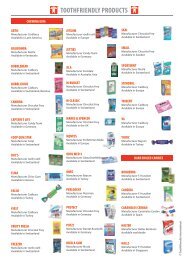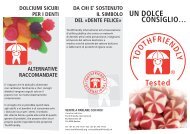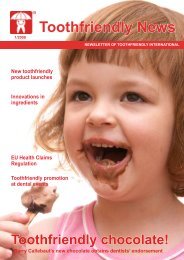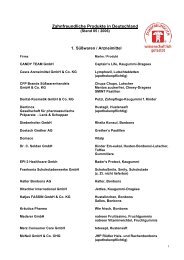TRENDS - Toothfriendly International
TRENDS - Toothfriendly International
TRENDS - Toothfriendly International
Create successful ePaper yourself
Turn your PDF publications into a flip-book with our unique Google optimized e-Paper software.
EU Health Claim Regulation:<br />
EFSA says “yes” to three dental claims on gum<br />
The first batch of scientific opinions on health claims was published by the European Food Safety Authority<br />
(EFSA) last October. EFSA gave thumbs up to three dental claims on sugar-free chewing gum.<br />
In a move that should make food marketing free of unsubstantiated health claims,<br />
the EU Food Safety Authority (EFSA) is currently reviewing around 4000 claims made<br />
by food producers. Most of the opinions it has published so far have dismissed the<br />
alleged health benefits – including health claims on probiotic foods.<br />
EFSA’s positive opinions have been granted to health claims with well established<br />
scientific support. These claims refer mainly to functions of vitamins and minerals,<br />
but also to sugar-free chewing gum for maintenance of dental health.<br />
EFSA approved the following claims:<br />
- Sugar-free chewing gum supports localized tooth mineralization<br />
- Sugar-free chewing gum reduces / improves dry mouth<br />
- Sugar-free chewing gum supports plaque acid neutralization<br />
EFSA found the following claims unsubstantiated:<br />
- Sugar-free chewing gum protects and strengthens teeth and gums<br />
- Sugar-free chewing gum is beneficial for weight management<br />
This first batch of 527 opinions published in October relates to only around one<br />
quarter of the 4000 claims on EFSA’s assessment list. Many dental claims, including<br />
“non-cariogenic” or “toothfriendly” have not yet been assessed. The scientists of EFSA<br />
continue to evaluate the remaining claims, but there are only vague timelines for<br />
their publication - according to one estimate, the final batch of EFSA opinions can be<br />
expected in mid-2011.<br />
EFSA’s opinions are ultimately passed on to the European Commission for final<br />
validation. The health claims with Commission’s approval are then placed on a list of<br />
permitted claims. In effect, all health claims which are not on the final positive list,<br />
will become illegal.<br />
Continues from page 6<br />
The reasons for the incomplete take-up of<br />
the Happy Tooth symbol by confectionery<br />
manufacturers are complex. In some cases<br />
products are sugar-free but do not fulfill the<br />
<strong>Toothfriendly</strong> criteria; this is mostly due to<br />
high amounts of citric or malic acids, or due<br />
to the presence of fermentable ingredients.<br />
Testing costs are also a bottleneck for small<br />
companies with wafer-thin margins.<br />
One reason cited by some companies is that<br />
their sugar-free products might already be<br />
communicated as being “good for teeth”<br />
with alternative claims. As of 2007, however,<br />
confectionery companies within the 25 EU<br />
Member States have been subject to new,<br />
stricter laws governing the health claims<br />
they are permitted to make on products.<br />
Any misleading dental claims or statements<br />
without scientific substantiation can be<br />
expected to fall under regulators’ scrutiny.<br />
In contrast to unauthorized health claims<br />
such as “anti-cariogenic” or “pro-dental”, the<br />
use of the Happy Tooth trademark and the<br />
adjoining explanatory term “toothfriendly”<br />
have an established legal basis and may<br />
continue to be made throughout the EU – as<br />
well as in all of the 170 other countries in<br />
the world.<br />
For further information on the <strong>Toothfriendly</strong><br />
concept and the Happy Tooth symbol,<br />
please visit: www.toothfriendly.org<br />
Can the Happy Tooth logo be<br />
used on product labels in the<br />
EU countries?<br />
Yes. Firstly, the Happy Tooth mark<br />
and its complementary claim “toothfriendly”<br />
are among the notified<br />
claims pending for a scientific evaluation<br />
of the EFSA. All EFSA opinions<br />
are expected to be published by the<br />
Summer of 2011. At least until then,<br />
all notified claims without a negative<br />
opinion by the EFSA/ EU Commission<br />
may continue to be made.<br />
Secondly, the Happy Tooth logo is<br />
a registered trademark and as such<br />
it can continue to be used until 19<br />
January 2022 (cf. Article 28 (2) of the<br />
Regulation).<br />
Quotations about testing?<br />
Companies interested in pH-telemetry<br />
testing options may either contact<br />
<strong>Toothfriendly</strong> <strong>International</strong> (+41 61<br />
273 77 07) or send an enquiry directly<br />
to one of the test centers:<br />
University of Zürich<br />
Prof. Thomas Imfeld<br />
Tel: +41 44 634 32 75<br />
e-mail: thomas.imfeld@zzmk.uzh.ch<br />
University of Witten/Herdecke<br />
Prof. Stefan Zimmer<br />
Tel:+49 2302 926663<br />
e-mail: Stefan.Zimmer@uni-wh.de<br />
<strong>Toothfriendly</strong> News 1/2010 7









